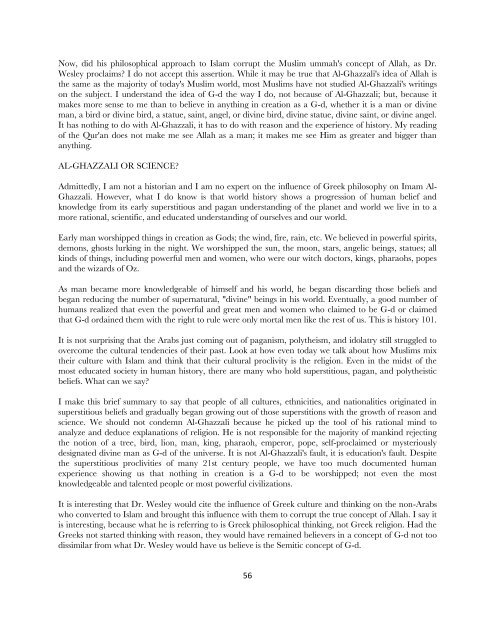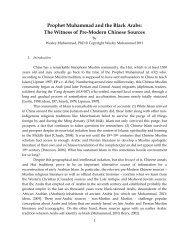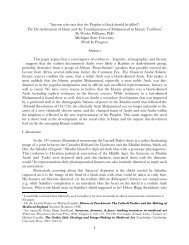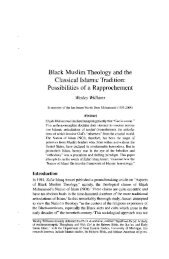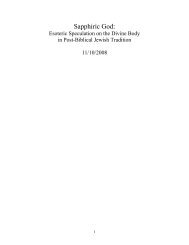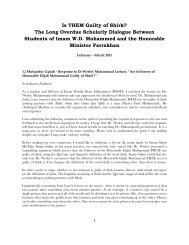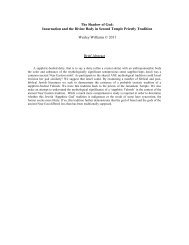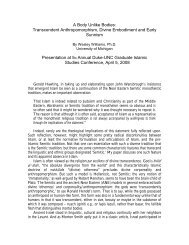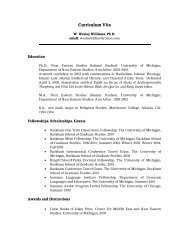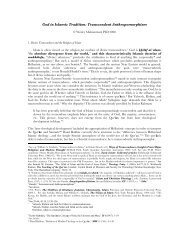Is THEM Guilty of Shirk? - Dr. Wesley Muhammad
Is THEM Guilty of Shirk? - Dr. Wesley Muhammad
Is THEM Guilty of Shirk? - Dr. Wesley Muhammad
You also want an ePaper? Increase the reach of your titles
YUMPU automatically turns print PDFs into web optimized ePapers that Google loves.
Now, did his philosophical approach to <strong>Is</strong>lam corrupt the Muslim ummah's concept <strong>of</strong> Allah, as <strong>Dr</strong>.<br />
<strong>Wesley</strong> proclaims? I do not accept this assertion. While it may be true that Al-Ghazzali's idea <strong>of</strong> Allah is<br />
the same as the majority <strong>of</strong> today's Muslim world, most Muslims have not studied Al-Ghazzali's writings<br />
on the subject. I understand the idea <strong>of</strong> G-d the way I do, not because <strong>of</strong> Al-Ghazzali; but, because it<br />
makes more sense to me than to believe in anything in creation as a G-d, whether it is a man or divine<br />
man, a bird or divine bird, a statue, saint, angel, or divine bird, divine statue, divine saint, or divine angel.<br />
It has nothing to do with Al-Ghazzali, it has to do with reason and the experience <strong>of</strong> history. My reading<br />
<strong>of</strong> the Qur'an does not make me see Allah as a man; it makes me see Him as greater and bigger than<br />
anything.<br />
AL-GHAZZALI OR SCIENCE?<br />
Admittedly, I am not a historian and I am no expert on the influence <strong>of</strong> Greek philosophy on Imam Al-<br />
Ghazzali. However, what I do know is that world history shows a progression <strong>of</strong> human belief and<br />
knowledge from its early superstitious and pagan understanding <strong>of</strong> the planet and world we live in to a<br />
more rational, scientific, and educated understanding <strong>of</strong> ourselves and our world.<br />
Early man worshipped things in creation as Gods; the wind, fire, rain, etc. We believed in powerful spirits,<br />
demons, ghosts lurking in the night. We worshipped the sun, the moon, stars, angelic beings, statues; all<br />
kinds <strong>of</strong> things, including powerful men and women, who were our witch doctors, kings, pharaohs, popes<br />
and the wizards <strong>of</strong> Oz.<br />
As man became more knowledgeable <strong>of</strong> himself and his world, he began discarding those beliefs and<br />
began reducing the number <strong>of</strong> supernatural, "divine" beings in his world. Eventually, a good number <strong>of</strong><br />
humans realized that even the powerful and great men and women who claimed to be G-d or claimed<br />
that G-d ordained them with the right to rule were only mortal men like the rest <strong>of</strong> us. This is history 101.<br />
It is not surprising that the Arabs just coming out <strong>of</strong> paganism, polytheism, and idolatry still struggled to<br />
overcome the cultural tendencies <strong>of</strong> their past. Look at how even today we talk about how Muslims mix<br />
their culture with <strong>Is</strong>lam and think that their cultural proclivity is the religion. Even in the midst <strong>of</strong> the<br />
most educated society in human history, there are many who hold superstitious, pagan, and polytheistic<br />
beliefs. What can we say?<br />
I make this brief summary to say that people <strong>of</strong> all cultures, ethnicities, and nationalities originated in<br />
superstitious beliefs and gradually began growing out <strong>of</strong> those superstitions with the growth <strong>of</strong> reason and<br />
science. We should not condemn Al-Ghazzali because he picked up the tool <strong>of</strong> his rational mind to<br />
analyze and deduce explanations <strong>of</strong> religion. He is not responsible for the majority <strong>of</strong> mankind rejecting<br />
the notion <strong>of</strong> a tree, bird, lion, man, king, pharaoh, emperor, pope, self-proclaimed or mysteriously<br />
designated divine man as G-d <strong>of</strong> the universe. It is not Al-Ghazzali's fault, it is education's fault. Despite<br />
the superstitious proclivities <strong>of</strong> many 21st century people, we have too much documented human<br />
experience showing us that nothing in creation is a G-d to be worshipped; not even the most<br />
knowledgeable and talented people or most powerful civilizations.<br />
It is interesting that <strong>Dr</strong>. <strong>Wesley</strong> would cite the influence <strong>of</strong> Greek culture and thinking on the non-Arabs<br />
who converted to <strong>Is</strong>lam and brought this influence with them to corrupt the true concept <strong>of</strong> Allah. I say it<br />
is interesting, because what he is referring to is Greek philosophical thinking, not Greek religion. Had the<br />
Greeks not started thinking with reason, they would have remained believers in a concept <strong>of</strong> G-d not too<br />
dissimilar from what <strong>Dr</strong>. <strong>Wesley</strong> would have us believe is the Semitic concept <strong>of</strong> G-d.<br />
56


